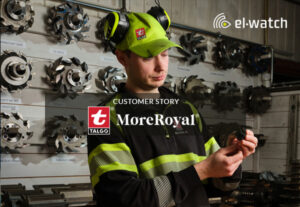Wireless sensor solutions are a game-changer in the aluminum industry, unlocking huge opportunities for improved efficiency and resource savings. Here is how:
The demand for smarter, more efficient, and sustainable practices is paramount as the world becomes more connected and industries evolve. Enter cutting-edge sensor solutions that enhance production processes and ensure the aluminum industry remains competitive globally.
How so? Well, the aluminum industry, like any other industry, faces unique challenges that require specifically tailored solutions. We’ll get back to these challenges and solutions in more detail, but let’s first take a look at the big picture and what the aluminum industry stands to gain from digitalization.
Contents:
- Digitalization’s role in transforming the aluminum industry
- Challenges in the aluminum industry
- The solution: Wireless sensors for industrial purposes
- Sensor applications in the aluminum industry
- El-Watch’s contributions to the aluminum industry
- Towards a better aluminum industry with wireless sensors
1. Digitalization’s role in transforming the aluminum industry
Digitalization is no longer a buzzword; it’s a necessity. The aluminum industry, like many others, is embracing the digital revolution to optimize processes, reduce costs, and improve product quality. New technologies, digital tools, and IoT enable companies to gather, analyze, and leverage data like never before. This data-driven approach leads to:
- Enhanced productivity: Real-time monitoring and predictive maintenance powered by sensor solutions ensure that equipment runs optimally, reducing downtime and increasing output.
- Improved quality control: With the ability to monitor processes in real-time, companies can ensure that the quality of aluminum meets the highest standards.
- Sustainability: Digital solutions, combined with sensor technology, allow for better resource management, leading to reduced waste and a smaller carbon footprint.
- Safety: Replacing manual measurements with fixed sensors and online data collection removes operators from hazardous areas.
Sidenote: IoT stands for the Internet of Things and simply refers to the digital connection of devices, like your smartphone, iPad, laptop, and El-Watch’s wireless sensors.
Learn more about IoT in our article: What are IoT sensors, and why are they a good investment?
The benefits of IoT sensor technology in industrial applications
Sensor technology has recently seen a meteoric rise, especially in industrial applications. These tiny devices, often part of a larger IoT ecosystem, can monitor temperature, pressure, humidity, and many other parameters. In the context of the aluminum industry, sensor solutions are proving invaluable. They:
- Streamline operations: With everything connected, processes can be automated and optimized for maximum efficiency.
- Engage predictive maintenance: Instead of waiting for machinery to break down, IoT helps us predict when maintenance is needed, reducing downtime.
- Detect anomalies: Early detection of issues in machinery or processes can prevent costly breakdowns and production halts.
- Optimize energy consumption: Sensors can monitor energy usage, allowing companies to optimize processes and reduce costs.
- Enhance safety: In an industry where high temperatures and heavy machinery are the norm and manual measurements prevail, sensors are a much safer alternative. Wireless monitoring of conditions can alert operators to potential hazards without personnel getting close to molten metal and toxic fumes.
- Enable Innovation: For innovation to take place, it’s essential to first assess the current situation and truly understand the core of the problem. With an abundance of data available, companies are well-positioned to innovate, discovering novel methods of producing aluminum or exploring new uses for the metal.

2. Challenges in the aluminum industry
While the aluminum industry is a cornerstone of modern manufacturing, it faces numerous challenges that can hinder its efficiency, safety, and overall productivity.
Among these challenges are the pressing need to reduce emissions in line with global environmental standards and grappling with high energy prices that can inflate production costs. Furthermore, there is a looming threat of limited raw materials in the future due to over-extraction and depleting reserves.
As the demand for aluminum continues to rise globally, addressing these specific challenges becomes of utmost importance. Sensor solutions, especially wireless ones, are emerging as a promising answer to many of these issues. Let’s delve deeper into the aluminum industry’s challenges to better grasp the pressing need for innovative solutions.
Prioritizing human safety in the aluminum industry
One of the paramount concerns in the aluminum industry is ensuring the safety of its workers. The production process exposes employees to various hazards that cutting-edge sensor solutions can mitigate. Some of the most pressing risks include:
- Risk of contact with hot metal, which can cause severe burns or injuries.
- Exposure to electrical hazards can lead to electrocution.
- Potential for getting caught in machinery, leading to crushing injuries.
- Exposure to harmful gases, such as fluorine gases and polycyclic aromatic hydrocarbons (PaH gases).
Extreme environments: Heat, dust, magnetic fields
The aluminum production process involves extreme conditions. Furnaces and cells in potrooms operate at high temperatures, producing intense heat that can adversely affect equipment and personnel.
Additionally, the production process generates significant dust, which can clog machinery, reduce efficiency, and pose health risks.
Magnetic fields, often a byproduct of the electrolysis process in aluminum production, can interfere with electronic equipment and sensors.
These extreme conditions necessitate robust and resilient sensor solutions that can withstand the harsh environment of the aluminum industry.
Manual measurements: Time-consuming and pose risks to health, safety, and the environment
Traditional monitoring and measurement methods in the aluminum industry often involve manual inspections. These are time-consuming and expose workers to potential health and safety risks, especially when dealing with molten aluminum and high-temperature environments.
From an environmental perspective, manual processes can lead to inefficiencies and waste, which can harm the environment. Implementing wireless and automated sensor solutions can drastically reduce the need for manual measurements, enhancing efficiency while prioritizing worker safety and environmental sustainability.
Limitations of wired sensors: High voltages and risk of short circuits
Wired sensors, traditionally used in many industrial settings, come with their own challenges in the aluminum industry. The high voltages or currents in parts of the production processes pose a risk of short circuits, which can lead to equipment damage and production halts.
Additionally, the cost of installing wired sensors is high. Drawing cables often proves to be much more expensive than the sensor itself, leading to increased expenses. This doesn’t even account for the extra work and resources required for the setup.
Moreover, wired configurations can be cumbersome, limiting flexibility and adaptability. In contrast, wireless sensor solutions eliminate the risks associated with wired connections, offering a safer and more flexible alternative for the aluminum industry.
Equipment durability and functionality
Given the extreme conditions of the aluminum production process, equipment durability is a significant concern. Machinery and sensors must be robust enough to withstand high temperatures, corrosive environments, and physical wear and tear.
Furthermore, they must function optimally, ensuring production runs smoothly and efficiently despite these challenges. Our specially tailored sensor solutions prioritize durability and functionality, consistently delivering accurate data, even in the harshest conditions.
The need for direct data integration into proprietary software
In today’s digital age, data is king. However, collecting data is just the first step. The data collected must be made available to the users, typically in proprietary software systems for the aluminum industry through software integrations, to truly benefit from sensor solutions. This allows for real-time analysis, predictive maintenance, and data-driven decision-making.
Not all sensor solutions offer direct data integration capabilities via open API. However, El-Watch’s Neuron Solutions does. We believe it is important that the customers own their own data, which is why we opt for open APIs.
These APIs allow customers to effortlessly integrate data from the sensors into their own systems. Such features can significantly enhance the aluminum industry’s ability to leverage data for improved operations and decision-making, addressing the challenges mentioned above.
3. The solution: Wireless sensors for industrial purposes
As industries globally embrace the digital revolution, the challenges presented by the aluminum industry are in dire need of innovative, efficient, and reliable solutions. In essence, with its flexibility and adaptability, wireless monitoring takes care of the aluminum industry’s core challenges, ushering in a new era of enhanced production and safety.
Monitoring 2.0: El-Watch Neuron sensors
El-Watch, with its cutting-edge Neuron sensors, is at the forefront of this wireless revolution in the aluminum industry. These sensors are not just a step up from traditional monitoring methods; they represent a complete overhaul, a Monitoring 2.0 explicitly tailored for industrial applications.
Proven efficiency and durability under extreme conditions
The Neuron sensors have been meticulously designed to withstand extreme industrial conditions. These sensors consistently deliver accurate data, whether met with the intense heat of smelters, dusty environments, or magnetic fields. Their robust build ensures longevity, reducing the need for frequent replacements and ensuring uninterrupted monitoring.
Enhanced safety in the aluminum industry
One of the standout benefits of El-Watch’s sensor solutions is their contribution to human safety. By reducing the need for manual measurements in high-risk areas, our wireless sensors optimize operations and reduce the risks of the aluminum industry’s workforce in a number of ways:
- Minimizing exposure to molten aluminum.
- Shielding workers from electrical dangers.
- Reducing the risk of machinery-related injuries.
- Limiting exposure to harmful gases.
Broad product range
El-Watch offers a diverse range of sensor types, ensuring that the specific needs of the aluminum industry are catered to. Whether it’s temperature, vibration, voltage, pressure, or any other type of measurement, there’s a Neuron sensor tailored for the job.
Product brochure
Find the perfect sensor solution
API integration
All our sensors come with API integration capabilities, ensuring that the data they collect seamlessly integrates into the customer’s software systems. This facilitates real-time analysis and data-driven decision-making, enhancing the industry’s operational efficiency.
Easy, quick, and painless installation
One of the standout features of the Neuron sensors is their ease of installation. Designed with the user in mind, these sensors can be set up in minutes, eliminating the need for prolonged downtimes and complex setups.
Their wireless nature ensures flexibility in placement, and their intuitive design ensures that even those without technical expertise can handle their installation. Additionally, the software offers easy configuration; simply add a sensor with a QR code, and you’re ready to go! This ease of use, combined with robust performance, makes them an invaluable asset in any industry.

4. Sensor applications in the aluminum industry
With its intricate processes and heavy machinery, the aluminum industry demands precision, safety, and efficiency at every step. Sensor solutions, especially wireless ones, are emerging as indispensable tools for addressing the unique challenges of this sector. Let’s delve into the specific applications of sensors in the aluminum industry to better understand how they are revolutionizing operations.
Cathode bar: Early warning of potential problems
The cathode bar is another critical component in the aluminum production process. Monitoring these bars is essential to get early warnings of cathode wear, which can lead to a metal runout. El-Watch’s Neuron solutions provide continuous data on the state of the cathode bars, ensuring that any anomalies are detected early and allowing for timely interventions.
Rotating machinery: Improved monitoring and maintenance
Rotating machinery, such as fans, motors, pumps, and compressors, is integral to the aluminum production process. However, these essential components often go unchecked due to the difficulties of manual monitoring.
Traditional approaches, including thermography or manual vibration measurements, offer only intermittent insights, lacking continuous trend monitoring. Consequently, significant changes in conditions might occur between each manual inspection, allowing potential problems to slip under the radar.
Wireless sensor solutions provide continuous oversight, gathering real-time data and identifying trends. This not only reduces the need for manual checks but also cuts costs and tackles health, safety, and environmental (HSE) challenges. By doing so, it ensures the machinery functions at its best and promptly identifies any irregularities.
Read more: https://el-watch.com/use_cases/condition-based-monitoring/

Busbar: Preventing production stoppages
The busbar, a crucial component in aluminum smelting, can spell disaster if it fails. Even a slightly increasing trend in temperatures can indicate an impending problem. If the busbar fails and the smelter is left without electricity for only a few hours, the cells start to freeze, and if this goes too far, the whole smelter can shut down. Wireless and automated monitoring can continuously track the temperature and other parameters, providing early warnings and preventing catastrophic production stoppages.
Read more: https://el-watch.com/use_cases/busbar-temperature/
Wedge monitoring: Safety during cell disconnection
Disconnecting cells is a critical operation, and monitoring the wedges during this process is paramount for safety. A cell that remains electrified when it should be disconnected poses significant risks to both equipment and personnel. Wireless sensors ensure that such cells are identified in real-time, ensuring the safety of the operations and reducing the risk of accidents.
Hour meter: Reducing manual labor and margin of error
Manual readings, while traditional, come with a host of challenges. Misreadings, misplaced paper slips, and the sheer time spent on manual data collection can lead to inefficiencies and errors.
Implementing sensor solutions for hour counting can drastically reduce these issues. Automating the process minimizes the margin of error, ensuring accurate data collection without the hassles of manual readings. This enhances efficiency and ensures that data-driven decisions are based on precise information.
Read more: https://el-watch.com/use_cases/engine-hour-meter-vehicles/
Product
Neuron Hour Meter
Differential pressure in ventilation: HSE improvements
Ventilation is crucial for both the machinery and the personnel in the aluminum industry. Whether it’s the furnaces, cells, or vehicle cabins, ensuring proper ventilation is paramount for health and safety.
Read more: https://el-watch.com/use_cases/analyzing-heat-exchangers-in-ventilation-systems/

Cabinet safety: Monitoring of electrical cabinets
Electrical cabinets, often overlooked, play a pivotal role in the safety and efficiency of the production process. Issues like poor contact in electrical connections or doors left open can lead to problems, with cabinets filling up with dust and potentially causing malfunctions. Our sensors can monitor these cabinets continuously, making sure that they remain in optimal condition and that any issues are addressed promptly.
Once more, El-Watch’s Neuron solutions can come to the rescue and monitor the differential pressure in ventilation systems, ensuring they work as intended. By doing so, the lifespan of the equipment is effectively prolonged, and the personnel’s health, safety, and environmental (HSE) conditions are significantly improved.
Read more: https://el-watch.com/use_cases/monitoring-electrical-installations-and-cabinets/

5. El-Watch’s contributions to the aluminum industry
El-Watch is at the forefront of the digital transformation wave, particularly in the aluminum industry. For instance, we’ve developed the «Neuron sensors» platform, a comprehensive solution tailored for industrial applications, offering cutting-edge predictive maintenance capabilities. And there has been no lack of interest.
In a landmark achievement, El-Watch recently inked its largest contract to date with the Hydro Karmøy technology pilot. Hydro Karmøy is one of Europe’s most significant aluminum plants and will now extensively incorporate El-Watch’s wireless sensors into its production processes.
As such, Hydro Karmøy is pioneering the large-scale deployment of this type of wireless monitoring. More specifically, El-Watch’s IoT wireless sensors are pivotal for overseeing the cathode bars in the smelter, essential for aluminum manufacturing at Hydro Karmøy.
By precisely tracking the cathode bars’ temperature instantaneously, early signs of discrepancies or issues can be identified, forecasting potential aluminum cell runouts. This enables timely interventions, minimizing downtime and potential harm to the smelter.
With a focus on enhancing safety and generating significant savings, El-Watch is poised to expand its technological applications across various industries and continents, aiming to become a leading sensor supplier in the global market.
Read more: Hydro invests millions in El-Watch’s pioneering sensor technology
6. Towards a better aluminum industry with wireless sensors
As we’ve explored throughout this article, the challenges the aluminum industry faces are both unique and demanding. From extreme environments to the intricate nuances of production processes, the demands for precision and reliability are immense.
Enter El-Watch Neuron sensors, a game-changer that promises to redefine the landscape of the aluminum industry. Our cutting-edge technology, tailored specifically for the challenges of this sector, offers a wide range of benefits that are hard to overlook.
Firstly, the efficiency brought about by these sensors is transformative. Secondly, safety is significantly enhanced with the adoption of sensor solutions. Lastly, the environmental benefits of these sensors cannot be understated, especially since they enable compliance with environmental regulations and position companies as sustainable entities in the eyes of stakeholders and consumers.
Ready to try wireless sensors?
Please contact our Sales Manager for some good advice and a nice sensor- chat.
The future of the aluminum industry
As we look toward the future of the aluminum industry, it’s clear that wireless sensor solutions will play a pivotal role. They represent more than just technological advancements; they symbolize the industry’s commitment to innovation, safety, and sustainability.
As companies continue to adopt and integrate these solutions, we can anticipate an aluminum industry that’s more efficient, safe, and in tune with the demands of the 21st century.
For those invested in the aluminum industry, whether as producers, stakeholders, or consumers, the message is clear: The future is bright, and wireless sensor solutions enable the prospects for further growth and improvement.
Resources
Softweb Solutions: How smart sensors are helping the environment
US Government Accountability Office: Science & Tech Spotlight: Air Quality Sensors
US National Library of Medicine: Advances in Smart Environment Monitoring Systems Using IoT and Sensors





